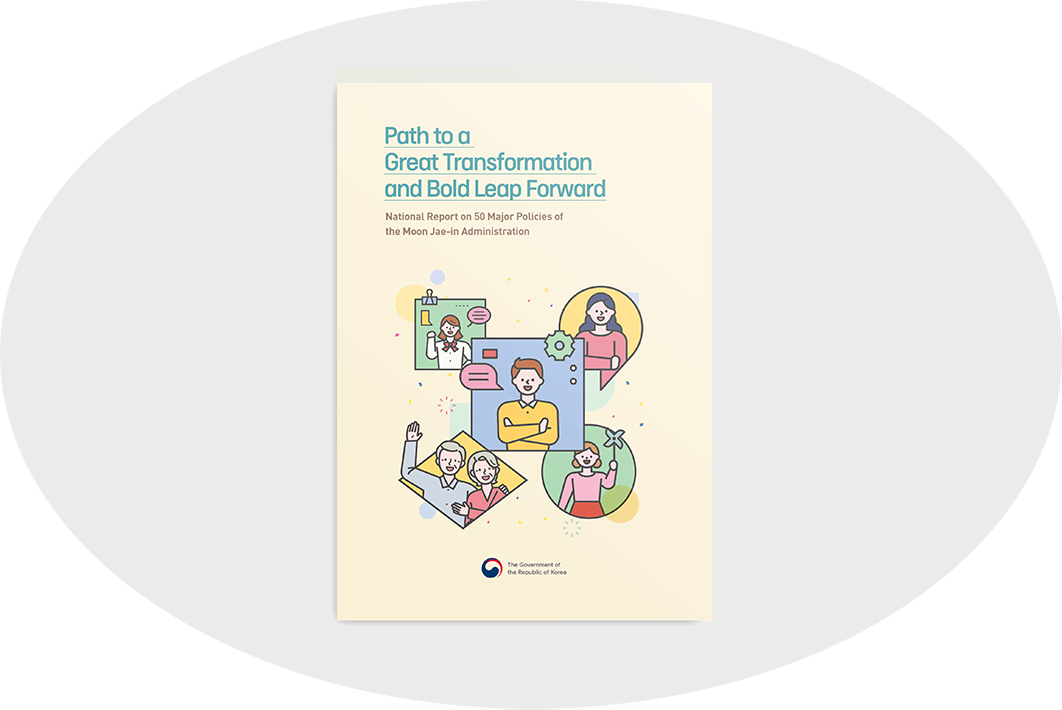Legacy of an Administration:
Unshakeable Korea

WRITTEN BY
Sohn Ji-ae
Photo courtesy of
KOCIS
Throughout its five-year term in office, the Moon Jae-in administration implemented 50 major policies to enable the country to prosper, even during times of crisis.
Five years ago in 2017, the people saw glimmers of hope when the Moon Jae-in administration came to power amid a political crisis following the nation’s first presidential impeachment. Since then, President Moon Jae-in has sought to live up to the people’s hope by endeavoring to make the nation a more prosperous and safer one.
Under President Moon’s leadership, the tension between the two Koreas thawed due to his persistent efforts to facilitate inter-Korean and first-ever U.S.-North Korea summits. Even in times of an unprecedented pandemic crisis, the Moon administration led the nation out of the hardship and an inevitable economic slowdown.
K-Quarantine Model
In a fight against the COVID-19 pandemic, the government implemented the so-called 3T Strategy (Testing-Tracing-Treatment) and social distancing effectively. The strategy was a success and the nation’s cutting-edge technology played a crucial role. The Moon administration utilized advanced information and communications technology (ICT). As a result, Korea had the lowest number of confirmed cases and deaths per 100,000 people among OECD countries.
The government also utilized ICT to speed up vaccination by operating an online appointment system and providing electronic vaccination certificates. It took only 28 days to go from a 50% vaccination rate to 70% of the population receiving the first dose, which was faster than Japan (44days), France (54 days), and the United Kingdom (118 days).
Korea’s swift, proactive measures backed up with technology have been held up as “a role model for pandemic response and prevention” across the world.
Korea as a Global Powerhouse
Combined with quarantine policies, the Moon administration implemented bold and proactive economic policies to minimize the economic impact caused by COVID-19.
While most economies were struggling, Korea took a bold leap forward with effective measures and became the world’s 10th largest economy, up from 12th in 2019. In 2020, Korea’s gross domestic product (GDP) per capita reached USD 31,497, overtaking Italy, a G7 country, as well as Russia and Brazil, to place the nation among the world’s top ten economies. Korea remains as a trade powerhouse as it ranks 6th in global exports and 9th in imports.
Recognizing the nation’s remarkable economic growth, the United Nations Conference on Trade and Development in July 2021 reclassified Korea from a developing country to a developed one, as well.
The major factor that drove the nation’s post-pandemic growth was not only its consistent competitiveness in conventional industries, like semiconductor and shipbuilding, but also President Moon’s Korean New Deal initiative targeting “new digital and green industries.”
Korean New Deal at the Center
The Korean New Deal, launched in July 2020, supported the economy through the pandemic by boosting creative and innovative products and services in digital and green industries.
As a major component of the initiative, the Digital New Deal strengthened data, network, and artificial intelligence (AI) eco-systems, resulting in the establishment of data for training AI and big data platforms. It also innovated a myriad of industries, including education and healthcare.
Data markets have grown rapidly with a 2.9 fold increase in the number of data providers, a 4.5 fold increase in the number of AI providers, and the domestic data industry market reaching KRW 19.3 trillion, up 14.3% compared to the previous year.
The Green New Deal, another component, made Korea’s green industries more competitive. Korea has invested in renewable energy sources, such as solar and wind, and eco-friendly transportation, like electric and hydrogen cars. The green efforts surely generated business opportunities, as Korea, as of 2020, has the highest market share of 34.5% for electric vehicle (EV) batteries in the world and accounts for 40% of global fuel cell power generation.
In line with the green policy, the government joined the growing global efforts to combat global warming with a pledge to reduce green gas emissions more rapidly by 40% compared to 2018 levels by 2030 and achieve carbon neutrality by 2050.
Korea has proven itself to be unshakeable and resilient, rising from all the challenges caused by the pandemic and consequential economic downturn. At the center of all of this was the tough, unswerving leadership guiding the nation on the road to a full recovery and an economic leap forward.
NEWS TICKER
Other Articles
-

Special Ⅰ Hall of Memories
-

Special Ⅱ No Longer Just an Eyesore
-

Trend Unique Prison Stories
-

Hidden View Gate of Hope
-

Interview Violinist Jinjoo Cho
-

Art of Detail Good as Gold
-

Film & TV All of Us Are Dead
-

Collaboration Emoticons: Businesses Collaborate with Creators
-

Current Korea Legacy of an Administration: Unshakeable Korea
-

Global Korea Korean Literature Week Event with Berkelouw Books
